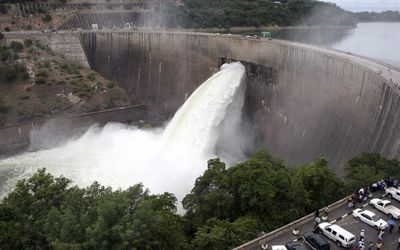
BY MTHANDAZO NYONI THE Zambezi River Authority (ZRA) last year slapped two power utilities, Zesa Holdings and Zesco Limited, with penalties amounting to US$12,1 million for over-utilising water at the Kariba Dam.
The ZRA which operates maintains, monitors, and regulates the water level in the Kariba reservoir, is a corporation jointly and equally owned by the governments of Zambia and Zimbabwe.
According to ZRA’s 2021 annual report, as of December 31, 2021, the power utilities had cumulatively utilised 49,76 billion cubic metres (BCM) of water, which translated to 11% above the 2021.
Of the total amount, Kariba North Bank Power Station (KNPS) utilised 25,18 BCM, which was 12% above the 22,5 BCM water allocation while Kariba South Bank Power Station utilised 24,58 BCM, which is 9% above the 22,5 BCM water allocation.
“Resultantly, the power utilities were charged over-utilisation penalties amounting to US$12,098 million in accordance with the provisions of Statutory Instrument No. 109/199 (Water Tariff) By-Laws,” the report reads in part.
“The impact of the two power utilities exceeding their 2021 water allocation was a 1,3m drawdown in the lake level from the projected 2021 closing (preferred) lake level of 479,69m (19,15 BCM or 30% usable storage) to the actual closing level of 2021 of 478,39m (13,06 BCM or 20% usable storage) recorded on 31st December 2021.”
“The Authority continued to engage the power utilities to reduce generation as informed by hydrological reviews of potential emerging hydrological risks that could call for further reduced water allocation to the power stations,” it said.
During the year under review, ZRA achieved an operating income of US$30,13 million compared with the budget of US$27,87 million, giving rise to a favourable variance of 811%.
- Chamisa under fire over US$120K donation
- Mavhunga puts DeMbare into Chibuku quarterfinals
- Pension funds bet on Cabora Bassa oilfields
- Councils defy govt fire tender directive
Keep Reading
“This was because of the over-utilisation of water by the two power utilities, ZESCO Limited (Zambia) and Kariba Hydro Power Company (KHPC of Zimbabwe). The combined water utilisation was 49,76BCM against an allocation of 45BCM, representing 10% water over-utilisation,” the report reads.
In addition, the operating expenditure exclusive of depreciation and other provisions was US$11,19 million against a budget of US$19,63 million resulting in a favourable variance of 43%.
The foregoing represented a budget performance of 57%.
The organisation said the low budget execution in the year was on account of liquidity challenges and the COVID-19 pandemic-induced movement restrictions.
“The adverse liquidity situation arose from non-settlement of water sales invoices by the two utilities and the foreign exchange control regulations that restricted access to the authority’s funds that were held in Commercial Banks in Zimbabwe.”
The total receivables from the two power utilities amounted to US$72,81 million (US$47,48 million previous year) representing a growth of 53% in the power utilities receivable over the previous year.
Further, ZRA said the restricted cash in Zimbabwe was US$13,2 million, bringing the total amount of funds the authority was not able to access to US$86,01 million.
The organisation, however, said its liquidity ratio continued to show a very good outlook of 8.71 times of current assets which could cover current liabilities.
“However, when the inaccessible funds mentioned above were removed; the resultant Acid Test Ratio, showed a paltry 0.23 times or only about 23% of the current liabilities that could be covered by the current assets, which well described the precarious liquidity situation the authority was facing,” it said.
“The Authority continued to engage the two power utilities with a view to ensuring that they settled the outstanding obligations.”
The organisation said there were positive developments in the trade receivables collections. With the agreed payment plans in place with both power utilities during the year under review, ZRA said it was able to clear off some of its obligations such as expunging retrenchment packages and payment towards the Kariba Dam Rehabilitation Project (KDRP) loan for these receipts.
The report notes that ZRA was able to execute some priority budgetary requirements. It should be noted though, that the Power Utilities continued making payment below average monthly water invoices that led to the growth in receivables.










